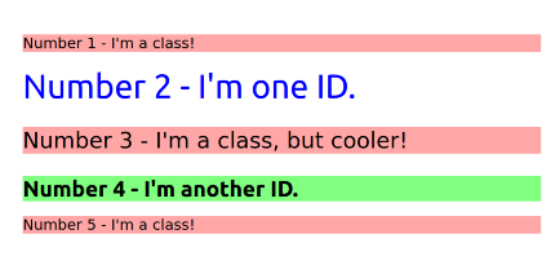|
|
||
|---|---|---|
| .. | ||
| solution | ||
| index.html | ||
| README.md | ||
| style.css | ||
Class and ID Selectors
Knowing how to add class and ID attributes to HTML elements, as well as use their respective selectors, is invaluable, and it's important to practice using them.
There are several elements in the HTML file provided, which you will have to add either class or ID attributes to as noted in the outcome image below. You will then have to add rules in the CSS file provided using the correct selector syntax. Look over the outcome image carefully, and try to keep in mind what elements look similarly styled (classes), which ones may be completely unique from the rest (ID), and which ones have slight variations from others (multiple classes).
It isn't entirely important what class or ID values you use, as the focus here is being able to add the attributes and use the correct selector syntax to style elements. For the colors in this exercise, try using a non-keyword value (RGB, HEX, or HSL). The properties you need to add to each element are:
- All odd numbered elements: a light red/pink background, and a list of fonts containing
Verdanaas the first option andsans-serifas a fallback - The second element: blue text and a font size of 36px
- The third element: in addition to the styles for all odd numbered elements, add a font size of 24px
- The fourth element: a light green background, a font size of 24px, and bold
Quick tip: in VS Code, you can change which format colors are displayed in (RGB, HEX, or HSL) by hovering over the color value in the CSS and clicking the top of the popup that appears!
Desired Outcome
Self Check
- Do the odd numbered
pelements share a class? - Do the even numbered
divelements have unique ID's? - Does the 3rd
divelement have multiple classes?
